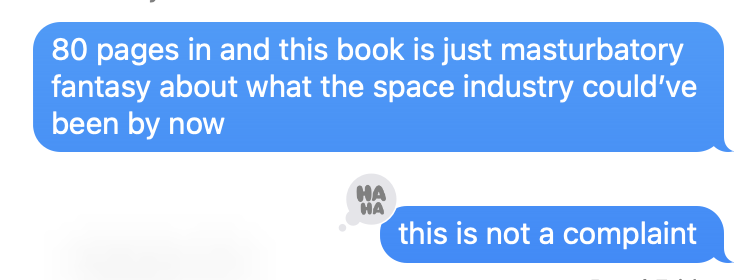Not a first-time read, but apparently I’ve never written up a review, so I’m finishing up a comfort-reread by talking up this book that I really enjoy.
The general setting here is a vague “near-future” kind of thing; having been published in 2010 or so, I think it’s pegged as being approximately 2015, but the technology is all vague enough that it still works as “vaguely near-future.” It’s recognizable concepts – we all get the idea of video games, of massively-multiplayer games in particular, and VR. It’s just turned up a little bit; the sort of voice control that we always hoped the Siris of the world would turn out to be, VR that uses hand-wavey technology to explain how it can be a fully tactile experience, and the hilariously-named “hyperburst memory” that is never even remotely explained. It works; that’s just silly enough a name that I can totally see someone coming up with something genuinely innovative and world-changing… and then naming it that.
Past that, this absolutely feels like a book written by someone who tinkers with computers for fun sometimes. There’s enough of a grasp of the concepts, enough talking about programming and thinking about tech, to make that clear; but it’s also just as clear that Duane is a really good writer, because she’s given it all a much more visual, visceral sense. I’m more than willing to accept the hand-waving science fiction aspect, because it means I get to skip past the boring bits of debugging that I am oh-so-familiar with, and instead get to imagine a world where the tech tools are to the point that it is visually interesting.
Lastly, I like most of the characters in the book. There’s some fun interactions present between Dev, the CEO of the game company, and Delia, the reporter sent to interview him — since we’re switching back and forth between their viewpoints, we get to see her suspicion that he can’t really be like that, and then get his own perspective on the fact that, yeah, he kinda is just like that, but also a lot more of why and how he is.
Overall, I just love this book. I did mention that it’s a comfort-read, didn’t I? A book doesn’t become one of my “I’m stressed and need to wind down” go-tos by being bad. Check it out.1
- This is a Bookshop affiliate link – if you buy it from here, I get a little bit of commission. It won’t hurt my feelings if you buy it elsewhere; honestly, I’d rather you check it out from your local library, or go to a local book store. I use Bookshop affiliate links instead of Amazon because they distribute a significant chunk of their profits to small, local book stores. ↩
